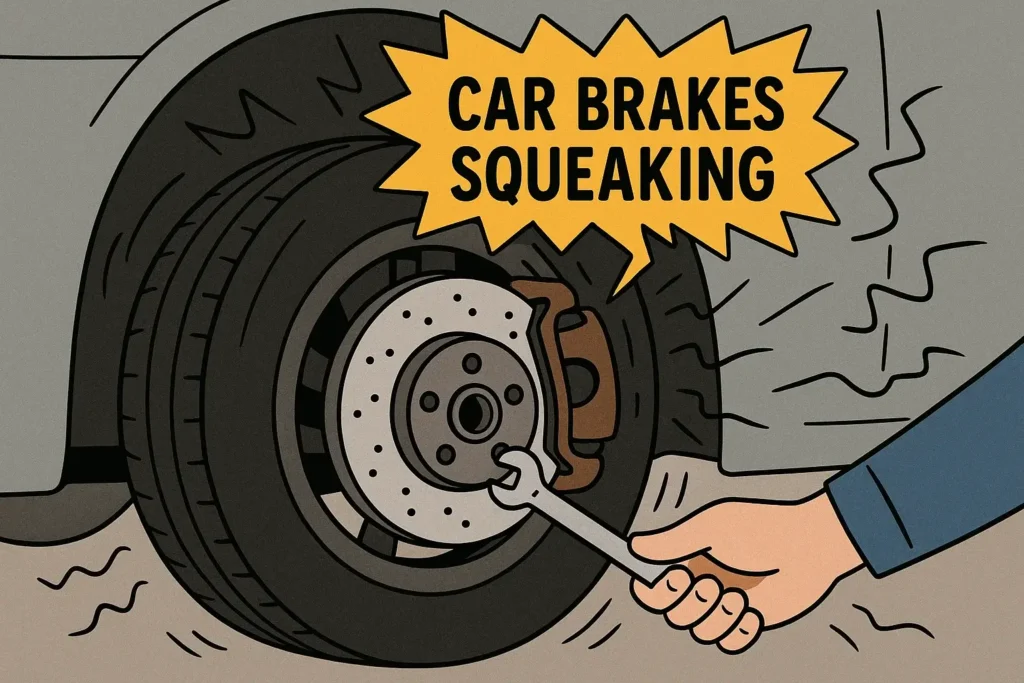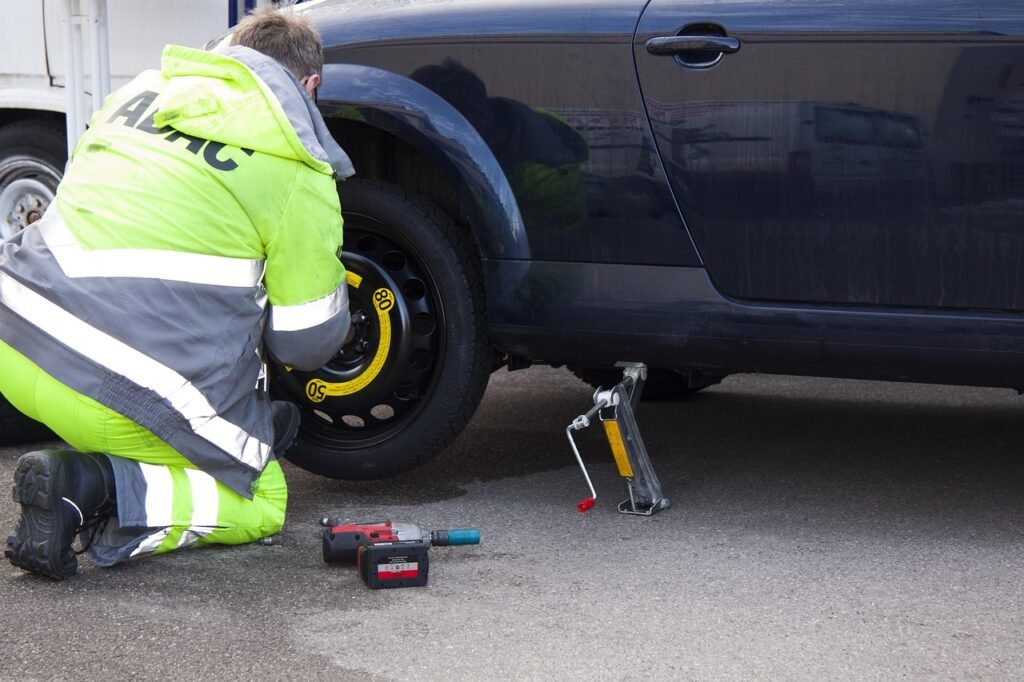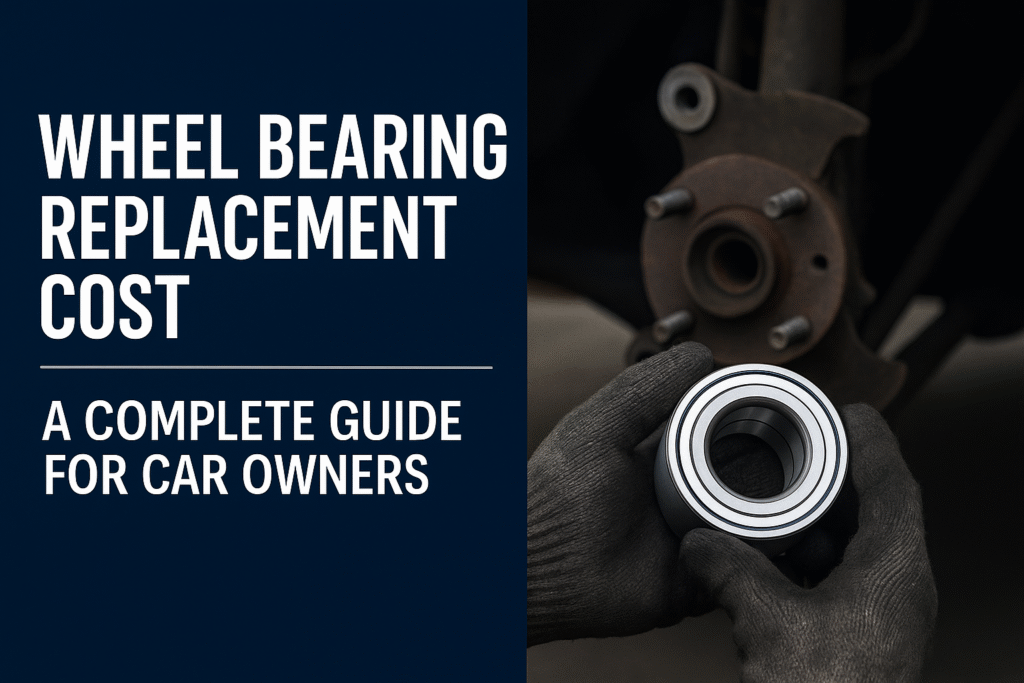If you’ve ever pulled up to a stop sign only to hear that annoying high-pitched squeak coming from your brakes, you’re not alone. Squeaky brakes are one of the most common automotive concerns drivers face and while some squeaking is normal, other times it can signal a problem that needs immediate attention.
In this guide, we’ll cover why your brakes might be squeaking, how to diagnose the issue, what you can do to fix it, and when it’s time to see a professional mechanic. Let’s dive in.
Is It Normal for Brakes to Squeak?
In some cases, brake squeaking is completely normal especially under specific conditions like:
- Early morning moisture: Dew or humidity can cause temporary rust or friction.
- Cold temperatures: Brake pads may squeak until they warm up.
- Light braking: Minimal pressure can lead to pad vibration and squealing.
However, persistent or loud squeaking could indicate an issue that needs to be addressed. Knowing the difference between harmless and concerning brake noises is essential for your vehicle’s safety and performance.
Common Causes of Squeaky Brakes
Understanding the root cause of brake squealing is the first step toward fixing it. Below are the most common culprits:
1. Worn Brake Pads
This is the most common reason brakes squeak. Modern brake pads have a built-in wear indicator a small metal tab that creates a high-pitched squeal when the pad material gets low. It’s a safety feature designed to alert you before the pads wear out completely.
Fix: Replace the brake pads as soon as possible. Driving too long on worn pads can damage your rotors and significantly increase repair costs.
2. Glazed Brake Pads or Rotors
Brake “glazing” happens when pads or rotors overheat, creating a shiny, hardened surface. This reduces braking efficiency and causes a squealing or screeching sound during use.
Common causes include:
- Aggressive braking
- Driving downhill for extended periods
- Improper pad installation
Fix: Lightly sanding the pad surface or replacing the pads may resolve the issue. Severely glazed rotors might need resurfacing or replacement.
3. Dust, Dirt, or Debris
Brake components are exposed to the elements, and road debris or brake dust can build up and cause friction that leads to squeaking.
Fix: Clean your brake components with a brake cleaner spray or have a mechanic perform a full brake service.
4. Lack of Lubrication
Your brake system includes several moving parts that require lubrication, such as caliper pins and pad contact points. When these go dry, squeaking and uneven braking can occur.
Fix: Apply high-temperature brake grease to the hardware during a brake job. Never apply grease to the friction surface of the pad or rotor.
5. Moisture or Rust Build-Up
Rust can form on the surface of the rotors when a vehicle sits overnight or for extended periods, especially in wet or humid conditions. The result? A temporary squeal during your first few stops.
Fix: Light braking during your first drive of the day usually wears off the rust. If the squeaking continues, a deeper issue may be at play.
6. Low-Quality or Incorrect Brake Pads
Cheap brake pads are more likely to squeak due to poor materials and inconsistent manufacturing. Incompatible pads can also cause improper fitment and noise.
Fix: Use OEM (Original Equipment Manufacturer) parts or high-quality ceramic or semi-metallic brake pads from trusted brands.
7. New Brake Pads (Break-In Period)
It’s normal for new brakes to squeak during the bedding-in process. This usually lasts 50–200 miles depending on the vehicle and pad type.
Fix: Follow the manufacturer’s bedding-in instructions. If the squeak persists beyond the break-in period, recheck the installation.

How to Diagnose Brake Squeaking
Before grabbing your toolbox or calling a mechanic, ask yourself these questions:
When is the squeaking happening?
- When braking: Likely pad or rotor issue.
- While driving without braking: Could be dragging caliper or worn hardware.
- Only in the morning or after rain: Moisture-related rust squeal.
Interesting read: Signs of a Failing Wheel Bearing
Where is the sound coming from?
- Front of vehicle: Often indicates front pads or caliper issues.
- Rear of vehicle: May involve drum brakes or rear pads.
Other symptoms to check for:
- Vibrations when braking
- Soft or spongy pedal feel
- Brake warning light on dashboard
If you’re unsure, have a certified technician perform a full brake inspection.
How to Fix Squeaky Brakes
Once you’ve identified the likely cause, here are some DIY and professional solutions:
Clean Brake Components
Use brake cleaner spray to remove dirt, rust, and buildup from rotors and calipers.
Apply Brake Grease
Lubricate caliper slide pins and pad backing plates with high-temp brake grease.
Replace Brake Pads
Install new, high-quality pads and inspect the rotors for wear or damage.
Resurface or Replace Rotors
If your rotors are uneven or glazed, resurfacing or replacement may be needed.

Check for Loose Parts
Ensure all hardware is tightened to manufacturer specs.
Pro Tip: Always bed-in new brakes properly to avoid noise and improve performance.
When Brake Squeaking Could Be a Serious Problem
Not all squeaks are created equal. Pay attention if you notice:
- Constant, high-pitched squealing – Worn-out pads contacting the wear indicator.
- Grinding noise – Pads worn down to the metal, potentially damaging the rotors.
- Squeaking with reduced stopping power – Could signal glazed or contaminated pads.
- Brake warning light – Indicates a system malfunction or fluid issue.
If any of these occur, do not delay seek professional brake service immediately.
Tips to Prevent Brake Squeaking
Prevention is easier (and cheaper) than repair. Here’s how to keep squeaks at bay:
- Use quality pads and rotors – Avoid no-name or ultra-budget brands.
- Clean brakes regularly – Especially if you drive in dusty or wet environments.
- Lubricate hardware – With every pad change.
- Bedding-in new pads – Follow proper break-in procedure to reduce early squeaks.
- Routine inspections – Check brake condition every 10,000–15,000 miles.
When to See a Professional
If you’re unsure about the cause or don’t feel comfortable handling the issue yourself, take your car to a certified mechanic. Professional brake services can include:
- Rotor resurfacing
- Brake fluid flush
- Full brake system inspection
- Caliper repair or replacement
Brake problems affect your safety, don’t take chances.
Conclusion
Squeaky brakes might be harmless or they might be a sign your car is trying to tell you something. From worn pads and dust buildup to moisture and glazing, there are many possible causes. Fortunately, most are easy to fix with routine maintenance or a quick visit to your local mechanic.
By catching issues early, you’ll protect your car’s braking system, save money, and stay safe on the road.
Are squeaky brakes dangerous?
Not always, but they can be. Sometimes it's just dust or surface rust. Other times, it means your brake pads are worn out and need replacing. If you're unsure, it's best to get them checked.
Can new brakes squeak too?
Yes, new brakes can squeak during the break-in period. This usually goes away after a few hundred miles. If it doesn't, there might be an installation issue or poor-quality pads.
How do I stop my brakes from squeaking?
You can try cleaning the brakes, using anti-squeal lubricant, or replacing worn pads. If the squeak persists, a mechanic can inspect and fix the issue.
Should I drive if my brakes are squeaking?
If it’s a light squeak, it might be safe for short drives. But if the noise is loud or constant, it’s a sign something’s wrong. Don’t risk it, get your brakes checked right away.



